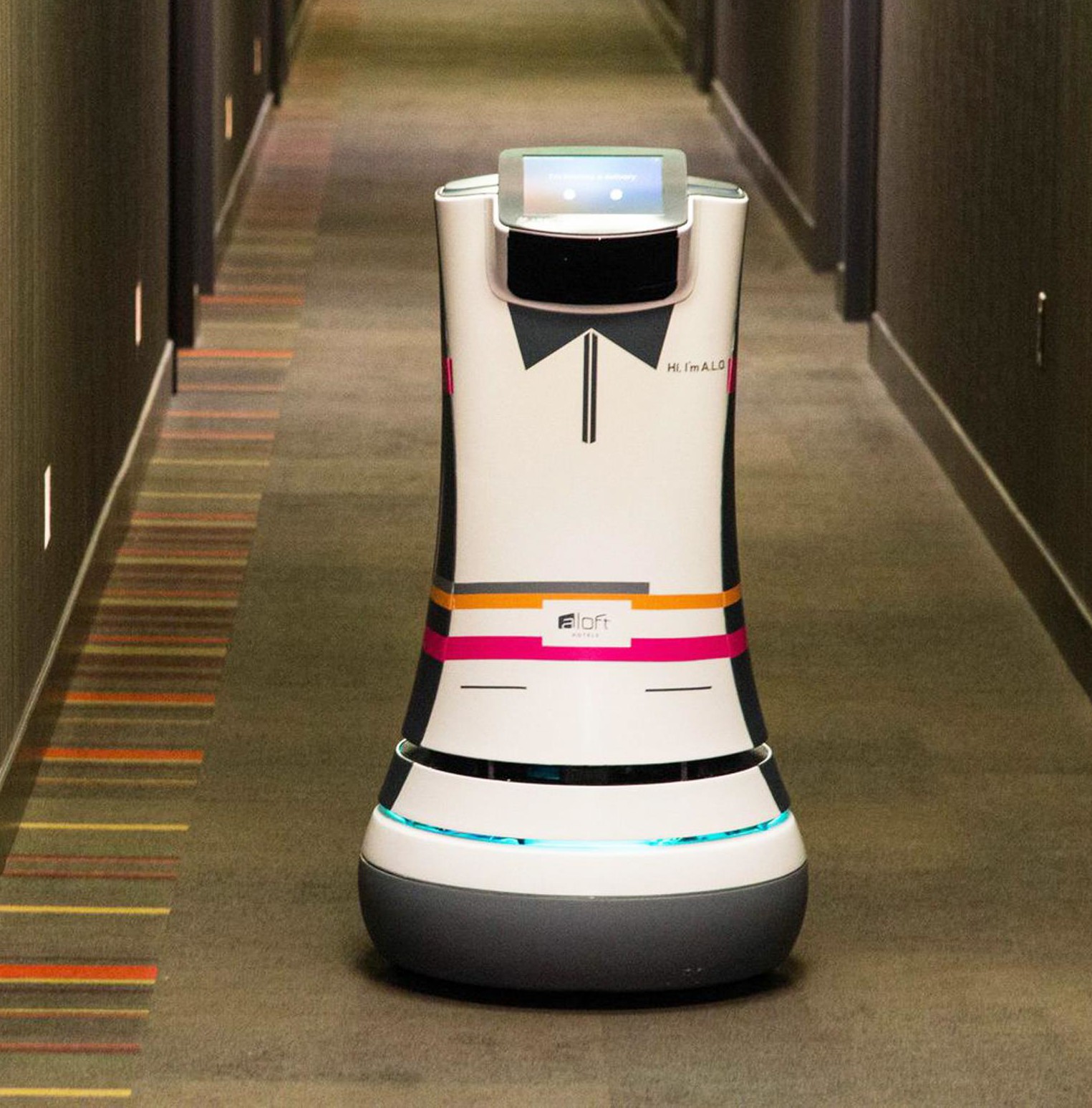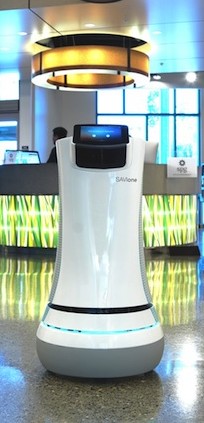Whether we’re baristas or bureaucrats, the robots will come for us.
No, they won’t take every position and in some cases they’ll create more, but if they kill enough jobs and displace a sufficient number of human workers, it can provoke societal disarray, especially in countries without enlightened policies to deal with the transition. The idea that smart machines will only complement workers and not supplant them seems particularly foolish to me. Even in the cases where that occurs, fewer humans will likely be needed.
Steve Cousins, founder and CEO of Savioke which provides robots to the services industry, clings to this notion of human-robot tandem in a TechCrunch piece:
Innovation is going to happen; we can’t and shouldn’t stop it if we want the U.S. to maintain its strong position in the global economy. It’s how we manage this transition that’s our collective challenge and opportunity. Income inequality continues to increase worldwide, with educated individuals gaining ground quickly in innovation economies, while lower-skilled workers fall behind. Instead of jettisoning the members of society who feel left behind by technological progress, we need to include them in the jobs created by innovation.
Finding ways to incorporate all members of society in technology’s rapid progress doesn’t just include education and training — though those are essential — but also requires engineers to design intuitive, easy-to-use machines. With touchscreen interfaces and simple commands, many of the emerging collaborative robots are easy to operate. In the same way cashiers have learned to use high-tech registers — basically retail computers — people can learn to operate robots in service, hospitality, retail, healthcare or other sectors. Thus, as robots take over mundane tasks, humans can rise into more fulfilling jobs as operators of these machines.•
I agree with him that innovation shouldn’t be stymied, but it’s likely that a lot more than graceful interfaces ad perhaps more than training will be required to smooth out what could be a very rough patch. There won’t be endless positions for “machine operators.”
Two excerpts on the topic follow.
From Danny King at Travel Weekly:
LOS ANGELES — Hotel robots that perform tasks like delivering amenities to guests or cleaning rooms will be the norm within the next five years, panelists at the Americas Lodging Investment Summit (ALIS) held here last week predicted.
The anticipated growth in hotel robots was largely attributed to falling technology costs and guests becoming more accustomed to the concept.
Early hotel adopters say devices such as Savioke’s Relay robot and Maidbot are gaining favor because they are efficient at both delivering items such as toiletries and bottled water to guests and cleaning rooms. They are also a novelty among family travelers.
Executives with both larger hotel owners like Host Hotels and smaller counterparts like Southern California-based Seaview Investors both expressed satisfaction on the ALIS panels with their early trials of the robots.
“We feel that it pays for itself, more from a guest-satisfaction standpoint than from labor savings,” said ALIS panelist moderator and Seaview Investors president Robert Alter. Seaview has used a Relay robot at his company’s Residence Inn Los Angeles LAX for the past 18 months.
Host Hotels managing director Michael Lentz, said, “We’re testing Maidbots for cleaning rooms. You have to think in years ahead that there are opportunities to reduce our operating costs.”
Front and center at the conference was Savioke’s Relay robotic butler, which debuted as Botlr at select properties under then-Starwood Hotels’ Aloft brand in 2014.
Panelist and Savioke “chief robot whisperer” Tessa Lau said hotels typically lease a Relay for about $2,000 a month (the company does not sell the robots) and the device, on average, performs a front-desk-to-room delivery of smaller products like toothpaste or bottled water in less than four minutes. Lau, too, alluded to the novelty factor, noting that many families with kids take “robot selfies.”•
From the Economist:
Steve Cousins, Savioke’s founder, is more realistic. In an article for TechCrunch, he accepts that his machines will eliminate the need for many of those currently working at hotels. But he argues that automation means jobs will be displaced rather than lost. “Dull and low paid occupations” will go, he writes, and be replaced by more interesting careers. This has frequently been true in the past. The Luddites, for example, burned weaving machines that were threatening their jobs in the 19th century. Yet as machines increased output and lowered prices, employment went up along with demand. The number of people working for weavers quadrupled between 1830 and 1900.
There are two big differences today, however. One is the speed at which new technological advances are introduced. Until the market catches up with the changes, there will probably be a lag between people’s jobs being automated away and new ones being created. We also seem to be heading for a more protectionist world. One reason why a Singaporean hotel might be so keen on employing Relay is that it has a shortage of people willing to work in Mr Cousin’s “dull and low paid occupations”. That is partly because of restrictions on foreign workers. Likewise, in London as many as 70% of jobs in the travel and tourism sector depend on migrants, according to the Association of British Travel Agents. If such labour is in short supply once Britain “takes back control” of immigration after Brexit, then hotels will face a simple choice: employ cheap robots or pay high wages for locals who are not keen on the jobs they have to offer. Expect more droids knocking on your hotel door with your morning coffee.•


